|
|
|
Sort Order |
|
|
|
Items / Page
|
|
|
|
|
|
|
| Srl | Item |
| 1 |
ID:
159871


|
|
|
|
|
| Summary/Abstract |
Identity cards and surveillance practices form an important part of migrant experience and politics. Drawing on fieldwork in construction sites and factory premises in Ernakulam district and a market frequented by migrants in Perumbavoor, a small city near Kochi in Kerala, this paper argues that ID-based surveillance of migrant workers occurs through a complex spatial web of state repression, local power structures and fissures within the classes of workers in Kerala. Migrant workers from North and Northeastern India, and unionized Malayali workers in construction sites and factories in Kerala, battle for and against these cards. Migrant workers resist not necessarily class power that inheres in capital, but the state and surveillance practices.
|
|
|
|
|
|
|
|
|
|
|
|
|
|
|
|
| 2 |
ID:
176989
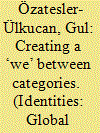

|
|
|
|
|
| Summary/Abstract |
Through the findings of research on Alevi and Sunni intermarriages in Izmir, Turkey, this article shows how partners in such marriages recognize differences between Sunniness and Aleviness, how they identify themselves in relation to these categories and define them, and how their marriage influences their identifications. The article presents how the intermarried spouses’ own definitions of their background categories reveal the influences of the historical construction of these categories in relation to each another, political stances and current negotiations. Self-identifications and perceptions of differences are handled within these influences while unifying criteria transcending the boundaries of these categories enable them to build on a sense of ‘we’. The findings show the spouses’ ambiguous, fluid, relational and contextual definitions and identifications within their understandings of one another as parts of a ‘we’, their ways of living together despite categorical and group differentiations, and negotiations within local and global discourses.
|
|
|
|
|
|
|
|
|
|
|
|
|
|
|
|
| 3 |
ID:
144799


|
|
|
|
|
| Summary/Abstract |
We experimentally investigate the effect of social identification and information feedback on individual behavior in contests. In all treatments, we find significant overexpenditure of effort relative to the standard theoretical predictions. Identifying subjects through photo display decreases wasteful effort. Providing information feedback about others’ effort does not affect the aggregate effort, but it decreases the heterogeneity of effort and significantly affects the dynamics of individual behavior. A behavioral model that incorporates a nonmonetary utility of winning and relative payoff maximization explains significant overexpenditure of effort. It also suggests that decrease in “social distance” between group members through social identification promotes prosocial behavior and decreases overexpenditure of effort, while improved information feedback decreases the heterogeneity of effort.
|
|
|
|
|
|
|
|
|
|
|
|
|
|
|
|
| 4 |
ID:
180572
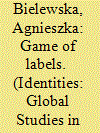

|
|
|
|
|
| Summary/Abstract |
The aim of this paper is to explore the identification choices of highly skilled migrants employed by companies in the Wałbrzych Special Economic Zone in south-west Poland in order to discuss how their identity is constructed and performed, especially how conflictual identifications are managed. Analysis of qualitative data shows the migrants call both their place of origin and their new place of life home. They identify as inhabitants of their new city and talk about gaining some traits of Polish national identity but they stress strong national identity related to their home country. Conflicts of loyalties in these hybrid identities are solved through a label game. Migrants identify with groups at different scales, from local groups, through city and national, to supranational. By playing with the scale of groups they can avoid conflicting identifications.
|
|
|
|
|
|
|
|
|
|
|
|
|
|
|
|
| 5 |
ID:
075768
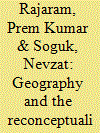

|
|
|
| 6 |
ID:
143361


|
|
|
|
|
| Summary/Abstract |
This paper estimates income polarization in China from 1978 to 2010 and decomposes the estimated polarization by population subgroups. In addition, a framework is proposed to disentangle a change in polarization into a growth and a redistribution component. This framework is then used to quantify the contributions of various income sources to a rise in polarization in China between 2002 and 2007. The analytical results suggest that (1) income polarization exhibited a broadly increasing trend from 1978 to 2010; (2) income polarization was large and rising among rural citizens, while low and declining among urban citizens; polarization of migrants also declined; (3) geographically, income polarization rose in east and particularly central China, while west China was most polarized with little change over time; and (4) the rise in polarization between 2002 and 2007 was mainly driven by the investment income, followed by transfers. Conversely, business income is polarization-reducing, especially in rural China. To a lesser extent, wage is also polarization-reducing, especially among migrants.
|
|
|
|
|
|
|
|
|
|
|
|
|
|
|
|
| 7 |
ID:
086289
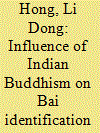

|
|
|
|
|
| Publication |
2009.
|
| Summary/Abstract |
Exactly when Buddhism spread to the Lake Erhai region continues to be a hotly debated issue among scholars. Upon examining currently available documents and artifacts, however, one starts to see evidence that Indian Buddhism spread to the Lake Erhai region of western Yunnan from the 'Southern Branch of the Silk Road' by about the middle of the seventh century ad.Indian Buddhism has had a profound impact on Bai history and culture, most notably in (1) the spread and assimilation of Acaya Buddhism into Bai culture, and (2) the Bai perception that they are the descendents of King Asoka, India's famous early promoter of Buddhism.
|
|
|
|
|
|
|
|
|
|
|
|
|
|
|
|
| 8 |
ID:
133710
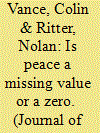

|
|
|
|
|
| Summary/Abstract |
Sample selection models, variants of which are the Heckman and Heckit models, are increasingly used by political scientists to accommodate data in which censoring of the dependent variable raises concerns of sample selectivity bias. Beyond demonstrating several pitfalls in the calculation of marginal effects and associated levels of statistical significance derived from these models, we argue that many of the empirical questions addressed by political scientists would - for both substantive and statistical reasons - be more appropriately addressed using an alternative but closely related procedure referred to as the two-part model (2 PM). Aside from being simple to estimate, one key advantage of the 2 PM is its less onerous identification requirements. Specifically, the model does not require the specification of so-called exclusion restrictions, variables that are included in the selection equation of the Heckit model but omitted from the outcome equation. Moreover, we argue that the interpretation of the marginal effects from the 2 PM, which are in terms of actual outcomes, are more appropriate for the questions typically addressed by political scientists than the potential outcomes ascribed to the Heckit results. Drawing on data from the Correlates of War database, we present an empirical analysis of conflict intensity illustrating that the choice between the sample selection model and 2 PM can bear fundamentally on the conclusions drawn.
|
|
|
|
|
|
|
|
|
|
|
|
|
|
|
|
| 9 |
ID:
126324
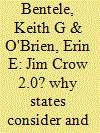

|
|
|
|
|
| Publication |
2013.
|
| Summary/Abstract |
Recent years have seen a dramatic increase in state legislation likely to reduce access for some voters, including photo identification and proof of citizenship requirements, registration restrictions, absentee ballot voting restrictions, and reductions in early voting. Political operatives often ascribe malicious motives when their opponents either endorse or oppose such legislation. In an effort to bring empirical clarity and epistemological standards to what has been a deeply-charged, partisan, and frequently anecdotal debate, we use multiple specialized regression approaches to examine factors associated with both the proposal and adoption of restrictive voter access legislation from 2006-2011. Our results indicate that proposal and passage are highly partisan, strategic, and racialized affairs. These findings are consistent with a scenario in which the targeted demobilization of minority voters and African Americans is a central driver of recent legislative developments. We discuss the implications of these results for current partisan and legal debates regarding voter restrictions and our understanding of the conditions incentivizing modern suppression efforts. Further, we situate these policies within developments in social welfare and criminal justice policy that collectively reduce electoral access among the socially marginalized.
|
|
|
|
|
|
|
|
|
|
|
|
|
|
|
|
| 10 |
ID:
127643
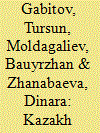

|
|
|
|
|
| Publication |
2013.
|
| Summary/Abstract |
This article focuses on determining the place and role of the Kazakh culture in the Eurasian civilizational area. It examines the choice of sociocultural development models for the Republic of Kazakhstan in globalization and localization conditions. The Kazakh culture is identified in the context of its interaction with the nomadic, Islamic, Russian, Central Asian, and East Asian civilizations. It analyzes the role of cultural factors in building the new post-Soviet Central Asian states.
|
|
|
|
|
|
|
|
|
|
|
|
|
|
|
|
| 11 |
ID:
106815
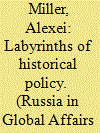

|
|
|
| 12 |
ID:
072115
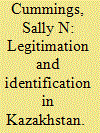

|
|
|
|
|
| Publication |
2006.
|
| Summary/Abstract |
This article analyzes Kazakhstan's contested process of nation- and state-building through a closer examination of the links between legitimation and identity. A wider Weberian emphasis on how the elite relates itself to the broader relationship between rulers and ruled illuminates the difficulties Kazakhstan's elite has encountered in providing both a collective identity and one of self. This complex symbiotic relationship between self-legitimation, legitimation and identification is explained in terms of the economy, polity and perceptions of the Soviet order.
|
|
|
|
|
|
|
|
|
|
|
|
|
|
|
|
| 13 |
ID:
147662


|
|
|
|
|
| Summary/Abstract |
The media impact on the process of ethnic identification, particularly with regard to how ethnic minority individuals reflect upon their ethnic origin, is the focus of this article. We analyse the relationships media consumption has with the identity-reflection process using biographical narratives of individuals from two ethnic minority communities in Eastern European countries: Slovaks in Hungary and Hungarians in Slovakia, focusing on how media consumption channels ethnic self-identification of minority individuals in terms of their affinity with their country of origin, their country of residence, and with Europe as a whole. Ethnic minorities in these two countries have been intensely affected by political changes of the twentieth and twenty-first centuries. We include analysis of some quantitative data and biographical narratives of ethnic minority individuals from the ENRI-EAST project, with close analysis of six biographical cases.
|
|
|
|
|
|
|
|
|
|
|
|
|
|
|
|
| 14 |
ID:
123193
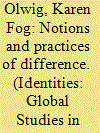

|
|
|
|
|
| Publication |
2013.
|
| Summary/Abstract |
The notion of diversity, which has gained increasing prominence in recent years, promises to rejuvenate migration research in terms of the theoretical and methodological lines of enquiry pursued, the empirical data generated and the interpretations and knowledge produced. By pointing to the existence of many possible forms of differentiation and belonging in social life, it offers a productive alternative to the ethnic framing that has characterised much migration research, whether large-scale quantitative surveys or small-scale ethnographic community studies. It, furthermore, can bring into sharper focus the significance of the temporal and spatial aspects of migration and related processes of inclusion and exclusion. Finally, it can stimulate the development of new, innovative research methods. There is still a need, however, to explore the complex nature of diversity as an empirical phenomenon and analytical concept. This is discussed with particular reference to mobility, contexts of sociality and the politics of academic concepts.
|
|
|
|
|
|
|
|
|
|
|
|
|
|
|
|
| 15 |
ID:
118067
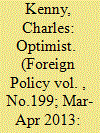

|
|
|
| 16 |
ID:
181155
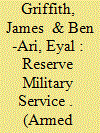

|
|
|
|
|
| Summary/Abstract |
This study examines reserve military service from a perspective of social construction—the ways in which the reservist’s conscious experiences are constructed to give meaning to military service. Content descriptions of conscious experiences of reserve military service are identified in past studies. Constructions fell into four broad categories: (1) complementary to life—reserve military service providing wanted satisfaction not otherwise achieved, material gain, or ideological commitment; (2) equitable arrangement—understood compensation for self-sacrifice; (3) discordant identity—requirements of military life blatantly or surreptitiously conflicting with established identity and civilian life; and (4) self-definition—reserve military service understood as an aspect of self-identity. Directions for integrating these constructions as a basis for future research are identified and discussed.
|
|
|
|
|
|
|
|
|
|
|
|
|
|
|
|
| 17 |
ID:
119232
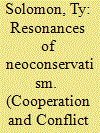

|
|
|
|
|
| Publication |
2013.
|
| Summary/Abstract |
Since 2003, scholars and pundits alike have vigorously debated the role of neoconservatism in the run-up to the US invasion of Iraq. Few, however, have examined the power of neoconservatism in terms of its resonance on an affective level. To more fully understand the influence that neoconservatism has had in recent US foreign policy debates, this article argues that scholarly analyses should also examine what could be termed its discursive efficacy. Neoconservatism incorporates many images and symbols of what many Americans would consider as being 'American', and the affective force of this discourse is vital in understanding its resonance with audiences. Employing insights from psychoanalytic theory, this article argues that a critically under-examined aspect of neoconservatism's varying influence on US foreign policy debates is found in the kinds of identifications that it offers audiences. The article, in this sense, contributes to the growing literature on neoconservatism, and raises the under-explored issue of resonance for the study of security discourses.
|
|
|
|
|
|
|
|
|
|
|
|
|
|
|
|
| 18 |
ID:
167101
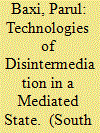

|
|
|
|
|
| Summary/Abstract |
The various lines of resistance against the Indian government’s Unique Identification Number project since its inception in 2009 form a national and publicly accessible narrative. But less is known about Aadhaar’s reception among civil society actors, non-profits who partnered with the state to implement this scheme among their constituencies. Drawing upon eighteen months of fieldwork in Mumbai, Ahmedabad and Delhi, this paper traces the nature of state and civil society engagement with Aadhaar. It demonstrates how this e-governance initiative encountered the politics and agendas of intermediary organisations long engaged in providing identity documents to the poor in the absence of state recognition of certain groups. The state sought a condition of disintermediation via biometric technology and collaborated with non-state actors to aid implementation. The failed encounter with a few non-profits working with the migrant poor demonstrates that a technocratic notion of identity and citizenship clashed with the materiality of local practices serving to maintain existing intermediations and resulting in exclusions from the Aadhaar scheme for certain groups. The paper argues that this encounter demonstrates the durability of the mediated state at a time when new technologies are deployed to remove intermediations, with consequences for the most marginalised populations.
|
|
|
|
|
|
|
|
|
|
|
|
|
|
|
|
| 19 |
ID:
155821
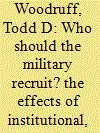

|
|
|
|
|
| Summary/Abstract |
The U.S. military spends millions of dollars and substantial institutional effort to understand enlistment motives and appropriately target incentives, recruiting effort, and marketing to prospective members. Similarly, researchers have worked for decades to identify, understand, and conceptualize enlistment motives. Much less effort has been made to understand the effect enlistment motives/goals have on individuals after they join. This research uses well-established enlistment motives/goals to identify and understand their effects on soldiers’ value to the military in terms of organizational identification and critical discretionary behaviors. Using multicohort cross-sectional data from future, initial training, and currently serving soldiers, this research finds that intrinsic enlistment motives/goals, such as altruistic service and self-enhancement, create greater relational and behavioral value than most extrinsic/economic enlistment motives/goals such as pay, gaining skills for future employment, and educational funding. Intrinsic enlistment motives/goals have a strong positive effect on perceptions of the organization, social satisfaction, organizational identification, and discretionary pro-organizational behaviors. Conversely, economic enlistment goals tend to be associated with higher levels of economic satisfaction but decreased organizational identification and pro-organizational behavior. Importantly, these effects tend to persist among soldiers who have been in the military for years. Contrary to the institutional–occupational framework, self-focused enlistment goals, both intrinsic and extrinsic, can creative substantial value for the military when they are aligned with organizational interests. Based on these findings, the practice of using enlistment motives/goals to maximizing enlistment without considering their long-term impact on relationship quality and behavior appears myopic and may fail to maximize long-term value for the military.
|
|
|
|
|
|
|
|
|
|
|
|
|
|
|
|
|
|
|
|
|